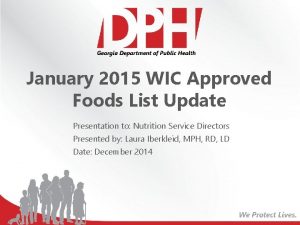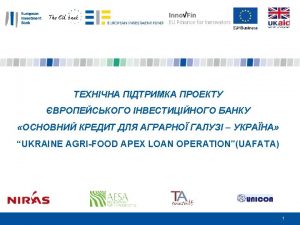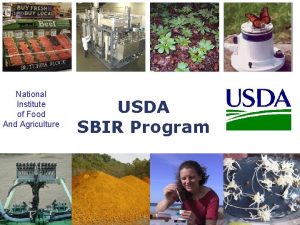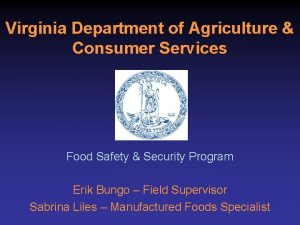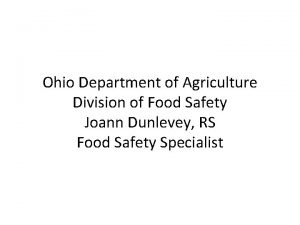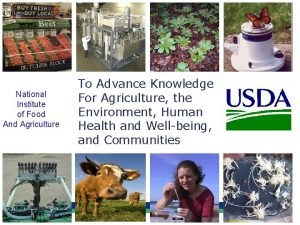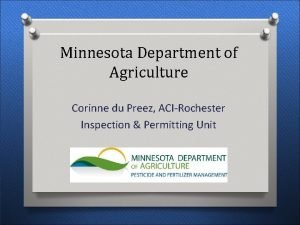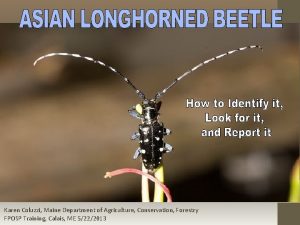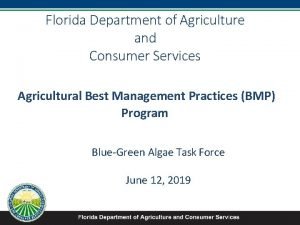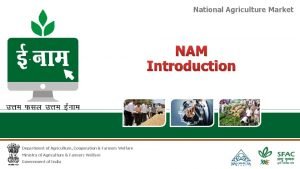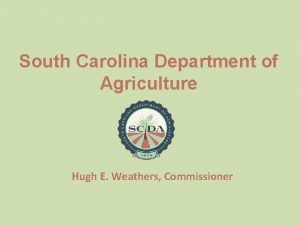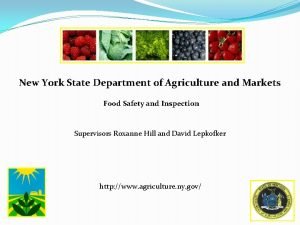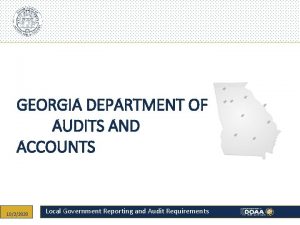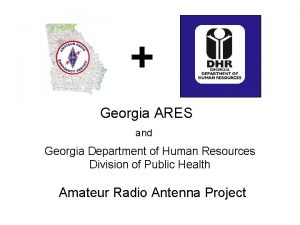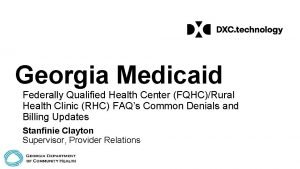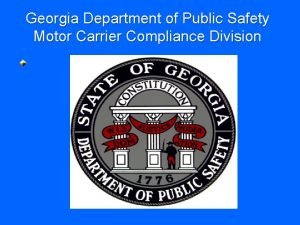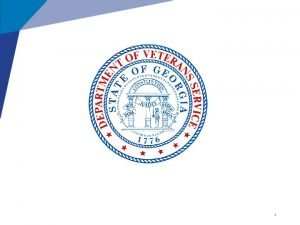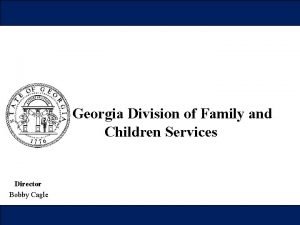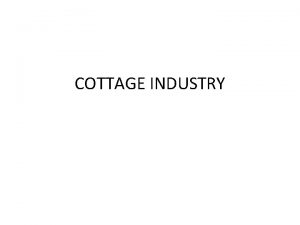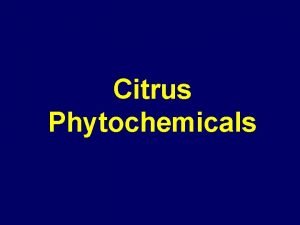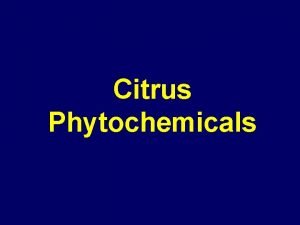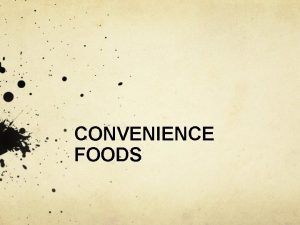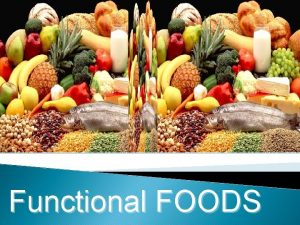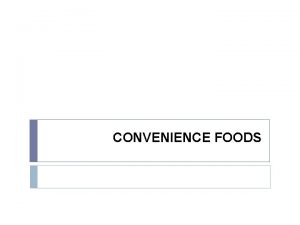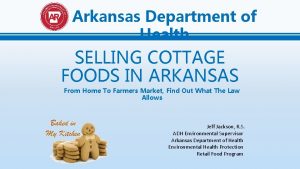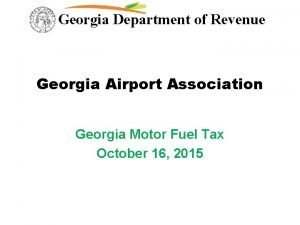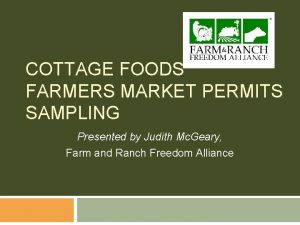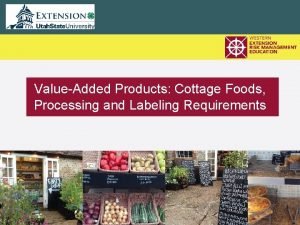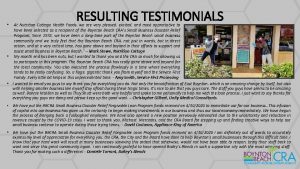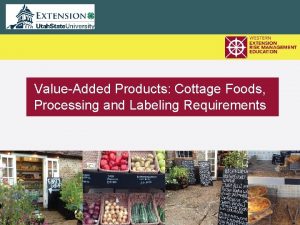COTTAGE FOODS GEORGIA DEPARTMENT OF AGRICULTURE GARY W




















- Slides: 20

COTTAGE FOODS GEORGIA DEPARTMENT OF AGRICULTURE GARY W. BLACK, COMMISSIONER FOOD SAFETY DIVISION

WHAT IS A COTTAGE FOOD BUSINESS? The cottage food industry is intended to be a business incubator Allows start-up businesses to work in a home kitchen Avoids overhead costs of a commercial kitchen: Commercial kitchen facility requirements Local business license expense Utilities (electrical, water, gas, etc. ) Taxes

STARTING A COTTAGE FOOD BUSINESS Cottage food sales are now allowed by the Department’s Regulations Chapter 40 -7 -19 Licensed Cottage Food operators are only allowed to manufacture and sale non-potentially hazardous foods (Foods that do not require refrigeration/low water activity) Sales are limited to retail transactions only Sales are limited to intra-state commerce only (no shipping across state lines)

WHAT FOODS ARE ALLOWED? LOAF BREADS, ROLLS, AND BISCUITS CAKES (EXCEPT THOSE THAT REQUIRE REFRIGERATION) PASTRIES AND COOKIES CANDIES AND CONFECTIONS FRUIT PIES JAMS, JELLIES, AND PRESERVES (NOT TO INCLUDE FRUIT BUTTERS) DRIED FRUITS

APPROVED COTTAGE FOODS DRY HERBS, SEASONINGS, AND MIXTURES CEREALS, TRAIL MIXES, AND GRANOLA COATED AND UNCOATED NUTS VINEGAR AND FLAVORED VINEGARS POPCORN AND POPCORN BALLS COTTON CANDY

CHEESE SPREAD (NOT APPROVED)

DEFINITIONS Cottage Food Operator: a person who produces cottage food products only in the home kitchen of that person’s primary domestic residence and only for sale directly to the consumer. Domestic Residence: a single-family dwelling or an area within a rental unit where a single person or family actually resides; but does not include any group or communal residential setting within any type of structure

DEFINITIONS Equipment: means a normal household article that is used in the manufacture of Cottage Food products such as a freezer, grinder, hood, ice maker, mixer, oven, refrigerator, scale, sink, slicer, store, table, temperature measuring device, or warewashing machine; but does not include industrial or commercial grade equipment that, due to their size, cannot be effectively cleaned in residential sinks or dishwashers. Home Kitchen: means a kitchen primarily intended for use by the residents of a home. It may contain one or more stoves or ovens, which may be a double oven, designed for residential use. It shall not include commercial equipment.

REGISTRATION Cottage food operators must register with the Georgia Department of Agriculture’s Food Safety Division prior to engaging in cottage food operations. Completion of application to include: Business name and address Food(s) to be produced Public/Private water source information Verification of Food Safety Training (American National Standards Institute accredidation) Verification that operator has checked with local government to ensure a home business is allowed

RIGHT OF ENTRY Registration application allows the Georgia Department of Agriculture the “Right of Entry” to the residence during normal business hours, or at other reasonable times, for investigation of consumer complaints, a foodborne disease outbreak, or other public health emergency.

LICENSING Annual Fee - $100. 00 (calendar year) Prorated to $50. 00 for initial license fee if after June 30 th Registration shall be required to be completed on an annual basis (update to the Department each year on production) One-time initial inspection of the home kitchen will be required prior to issuance of license (two inspectors will be present for home inspections)

WATER REQUIREMENTS Public Water Source – Copy of water bill to be submitted at time of licensing Private Water – Must be sampled prior to licensing May be performed by a private lab, County Health Department, or Georgia Department of Agriculture If GDA – Cost will be $100. 00 Water to be tested for coliform bacteria and nitrates This will be required on an annual basis!

LIMITATIONS Sales – Cottage Food sales are limited to the end user only. No wholesale distribution. A Food Sales Establishment License would be required for wholesale of food products. Cottage Food Operator may only produce the items listed on their registration form. Cottage Food Products shall be produced at times separate from domestic activities (Example: family meal preparation). Home canned produce cannot be used in production with the exception of jams and jellies. Ingredients must be from an “approved source”.

LICENSE Must be displayed at “Point of Sale” License will state: “This license allows for the retail sale of home produced food. Food sold under this license shall be to the end consumer. Food produced in this facility is not subject to routine inspection, nor should this license be construed as a substitute for the Department’s Food Sales Establishment License”

PRE-OPERATION INSPECTION Educational meeting to review regulations and limitations Verification of residential kitchen Verification of sanitary conditions Completion and receipt of license application, fee and supporting documents (training certificate, water sample lab report or copy of public water bill)

SALE OF PRODUCT BY WEIGHT Only an approved scale may be used if sale of food product is by weight Scale will be checked for accuracy and certification sticker affixed to the scale at time of inspection Look for statement on scale “Not Legal for Trade”

MINIMUM BEST PRACTICES Hand washing Bare Hand Contact with Ready to Eat Foods Hair restraints and Clean Outer Garments Eating, Drinking, Use of Tobacco during production Preventing Contamination When Tasting Cottage Food Operator Health Unauthorized Personnel Food Contact Surfaces Proper Storage Pest Control Pets

PRODUCT LABELS Business name and home address The following statement shall be conspicuously displayed on all cottage foods: “Made in a cottage food operation that is not subject to state food safety inspections” Common name of product Ingredients in descending order of predominance by weight Net weight or volume of product Allergen statement Nutritional information if applicable

GA DEPT OF AG WEBSITE

Georgia Department of Agriculture Food Safety Division South District Office 3150 US Hwy. 41 South Tifton, GA 31794 Phone: 229 -386 -3489
 Missouri wic food list
Missouri wic food list Department of agriculture
Department of agriculture Usda sbir
Usda sbir Virginia department of agriculture and consumer services
Virginia department of agriculture and consumer services Ohio cottage food law label
Ohio cottage food law label Department of agriculture sbir
Department of agriculture sbir Minnesota department of agriculture
Minnesota department of agriculture Maine department of agriculture conservation and forestry
Maine department of agriculture conservation and forestry Fl dept of agriculture
Fl dept of agriculture Site:slidetodoc.com
Site:slidetodoc.com Sc department of agriculture
Sc department of agriculture Article 20-c food processing license
Article 20-c food processing license Production doae
Production doae Tiffany taylor georgia department of education
Tiffany taylor georgia department of education Georgia department of audits
Georgia department of audits Ga dhr
Ga dhr Georgia department of community health
Georgia department of community health Georgia department of motor vehicle safety
Georgia department of motor vehicle safety Georgia department of public health
Georgia department of public health Gdvs locations
Gdvs locations Georgia department of children and families
Georgia department of children and families
